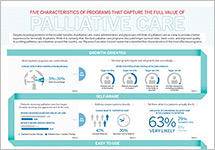Auto logout in seconds.
Continue LogoutEditor's note: This popular story from the Daily Briefing's archives was republished on Feb. 12, 2019.
Seriously ill patients said that living with certain conditions may be worse than death, according to a study published in JAMA Internal Medicine—but the report authors warn that "patients may underestimate their abilities to adapt to certain health states."
Download URMC's end-of-life conversation prompts
University of Pennsylvania researchers surveyed 180 severely ill patients age 60 and older who were admitted to a Pennsylvania hospital and had conditions ranging from advanced heart failure to malignant cancer.
Researchers asked patients to rank end-of-life limitations, such as needing full-time care and suffering constant pain, as being better than, worse than, or the same as death. The surveyed patients had not experienced any of the limitations.
Findings
The survey found that a majority of respondents considered six conditions as bad as or worse than death:
- Bowel and bladder incontinence, cited by about 70 percent as equally as bad as or worse than death;
- Reliance on a breathing machine, cited by about 70 percent of respondents;
- Inability to get out of bed, cited by about 70 percent of respondents;
- Being confused all the time, cited by about 60 percent of respondents;
- Reliance on a feeding tube, cited by about 55 percent of respondents; and
- Needing around-the-clock care, cited by more than 50 percent of respondents.
But the survey also found that a vast majority of respondents said that needing to be at home all day, being in moderate pain all the time, or needing to be in a wheelchair would not be preferable to death.
Survey limitations
The study authors said that more research is needed, as they sampled only a small number of patients at one hospital.
In addition, they said that, since none of the patients had experienced any of the limitations desscribed, they may have overestimated the conditions' difficulty. According to New York Magazine, some studies have supported that view, suggesting that people are often bad at predicting how they'll feel in the future.
For example, a 2004 study of health people found that most said they would rather not have medical interventions to prolong a low-quality life. However, dying people who were experiencing low quality of life almost unanimously told researchers they would use any available medical interventions to prolong their life, even if just by a few days.
The authors of the new JAMA Internal Medicine study wrote, "Patients may underestimate their abilities to adapt to certain health states, such that once-feared states become more tolerable once they are experienced" (Foley, Quartz, 8/2; Dahl, "Science of Us," New York Magazine, 8/3; Miller, LiveScience, 8/1; Rubin et al., JAMA Internal Medicine, 8/1).
Next, get URMC's end-of-life conversation prompts
When it comes to end-of-life care, most organizations struggle to meet patients' needs. In a recent poll, 87% of Americans age 65 and older said that they believe their doctor should discuss end-of-life issues with their patients; however, only 27% of those polled had actually discussed these issues with their doctor.
Download URMC's conversation prompts to start improving end-of-life care for patients.
Don't miss out on the latest Advisory Board insights
Create your free account to access 1 resource, including the latest research and webinars.
Want access without creating an account?
You have 1 free members-only resource remaining this month.
1 free members-only resources remaining
1 free members-only resources remaining
You've reached your limit of free insights
Become a member to access all of Advisory Board's resources, events, and experts
Never miss out on the latest innovative health care content tailored to you.
Benefits include:
You've reached your limit of free insights
Become a member to access all of Advisory Board's resources, events, and experts
Never miss out on the latest innovative health care content tailored to you.
Benefits include:
This content is available through your Curated Research partnership with Advisory Board. Click on ‘view this resource’ to read the full piece
Email ask@advisory.com to learn more
Click on ‘Become a Member’ to learn about the benefits of a Full-Access partnership with Advisory Board
Never miss out on the latest innovative health care content tailored to you.
Benefits Include:
This is for members only. Learn more.
Click on ‘Become a Member’ to learn about the benefits of a Full-Access partnership with Advisory Board
Never miss out on the latest innovative health care content tailored to you.

